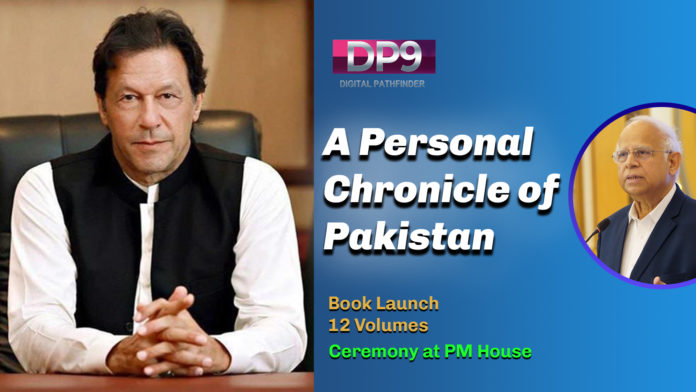A book launching ceremony of defence analyst and Chairman Pathfinder Group Ikram Sehgal’s published work in 12 volumes titled ‘A Personal Chronicle of Pakistan’ was held at the Prime Minister’s House on August 03, 2021. Prime Minister (PM) Imran Khan graced the occasion as Chief Guest.
Moeed Pirzada, renowned political commentator, geo-strategic analyst and television news journalist moderated the book launch and started off by thanking the guests on behalf of Ikram Sehgal, thanking particularly PM Imran Khan who, despite his very tight schedule, agreed to grace the occasion. Moeed briefly shed light on Ikram Sehgal’s history of writing as a journalist over the last forty years or so that led to the publication of his 12 volumes, aptly titled ‘A Personal Chronicle of Pakistan’. Moeed then introduced the President of the World Economic Forum (WEF) and former Minister of Foreign Affairs, Norway, Mr. Borge Brende whose message was relayed via video link.
Mr. Borge Brende: Dear Ikram, the launch of ‘A Personal Chronicle of Pakistan’ is a momentous day for you as a writer, it is also an opportunity for all of us to reflect on the defining period of Pakistan’s history as seen from your privileged vantage point. The silver thread linking your escape for the prisoner of war camp to the launch of these 12 volumes today is your commitment to doing something meaningful with the life we have all been given. This commitment of yours, naturally extended to your desire for your country of birth to develop in meaningful economic and diplomatic role for itself in the region and the world. Living up to your long-standing engagement with the WEF, for several years, recently also with your son, Zarrar have flown the flag of Pakistan at the Forum’s Annual Meeting in Davos, doing your part to make sure that the business community and environment is properly represented here alongside other nations. Beyond your writing is your desire to see Pakistan’s potential fulfilled both by courageously pointing out what does not work and by having the vision to identify the opportunities for its development. Pakistan has many opportunities and these volumes are a gift to the next generation who will do well to follow your principled example in both business and public life. Dear Ikram, my sincere congratulations on the launch of these 12 volumes and also my congratulations and full respect to for what you have achieved both in business and in public life and even more importantly, for standing up for important values in your country and globally. Thank you.
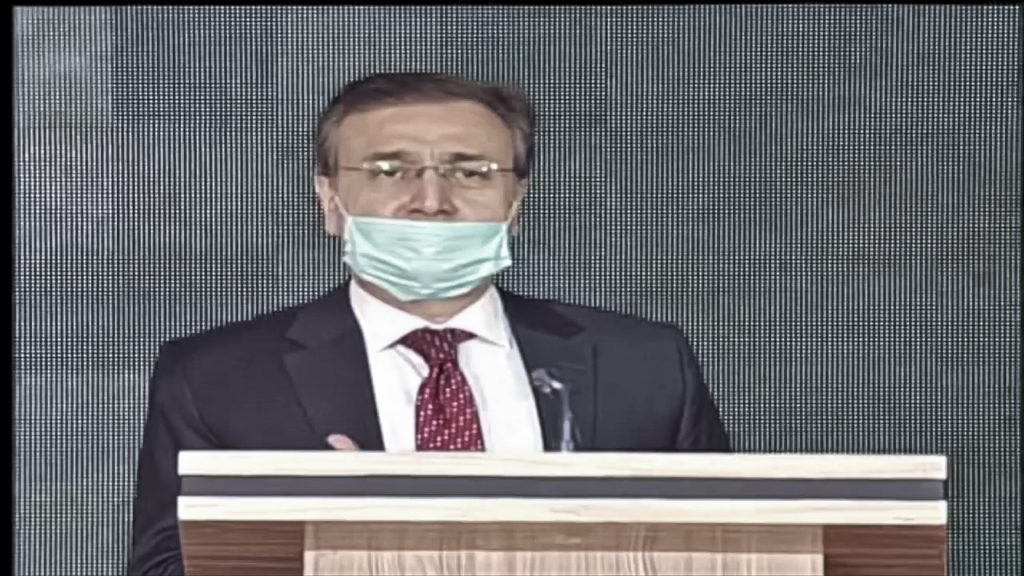
Moeed Pirzada: Mr. Prime Minister, many other messages were received but because of paucity of time, one other message is being relayed from His Highness Sheikh Nahayan Bin Mubarak Al Nahayan, the cabinet member and Minister of Tolerance and Coexistence of UAE.
H.H. Sheikh Nahayan Bin Mubarak Al Nahayan: The very best way to celebrate the publication of Ikram Sehgal’s life story and of his contributions to public life for the past 40 years would be to read his remarkable book that is being launched today. The book clearly signifies what we all know about Ikram’s dedication, commitment, common sense and generosity of spirit, his contributions to public discourse and discussions of important national issues that are displayed in this book and are a reflection of his hard work, loyalty and commitment to Pakistan and its people. My dear brother, I know what a commitment you have made to your beloved country over your lifetime, I am honoured to have this opportunity to pay tribute to you, you have my highest regards and sincerest gratitude for the excellent work you have done. On behalf of everyone assembled here today I thank you for this compilation of articles you have written over the last many decades that tell your story. I am confident this book will help to promote knowledge and pride in Pakistan and its great people.
Moeed Pirzada: I just want to say that this is not only the life story of Ikram Sehgal but a very interesting history of Pakistan. I would like to share with you when my daughter who is 16 years old, received the 12 volumes she started reading and at one point said that this was very interesting to her as she was unaware of many aspects of Pakistan’s history 1980 onwards. I would now like to request Mr. Ikram Sehgal to come on stage and share with us his personal views.
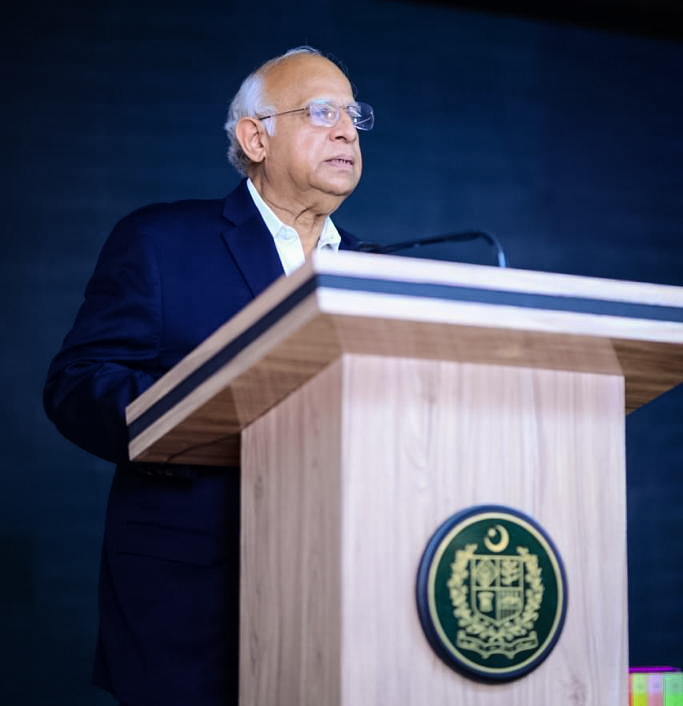
Mr. Ikram Sehgal: Bismillah Ar Rahman Ar Rahim. Prime Minister, Gen Ali and Nilofar, ladies and gentlemen: I would like to thank Imran Khan from the bottom of my heart as I believe this to be an historic occasion for myself as I do not know whether any book launching ceremony was ever held in the Prime Minister’s House. I believe and I have always written that one of our biggest drawbacks is the state of our education. I have already thanked you Prime Minister but I must speak about some people who I have invited here, with permission. About Gen Ali, he is my senior, his wife is like my own sister when my sister passed away who was friends with Gen Ali’s wife, she told me that from now on I am your sister. The presence of Gen Ali here today is a matter of great honour for me as what can I say about him. He is from the same Aitcheson College as you, Prime Minister but I must tell you another thing about him; my first meeting with him was on a cricket field. I was among the reserves that day but when Sikander Ameer and Farooq Hameed came on to bowl on the nets, our opening batsmen did not budge, refusing to bat. It would be apt to say that he is the nursery of fast bowling in Pakistan, followed by many others.
I have today brought some people with me, my family, my son Zarrar, his wife Kashmala, my grand children Amani, Elena and Suleman who came especially from New York. Other than this I have also brought the Principal Lawrence College, Mujahid Alam as well as two students and a faculty member of the college. When I was graduating from the Military Academy, I had hopes of winning the Sword of Honour. Our course had to be shortened to two years because of war and I was told that anyone who would win on ‘Tactics’ would win the Sword of Honour. I went on to win on Tactics and everyone congratulated me, however the Sword of Honour was awarded to someone else who was very deserving. The three people who were literally in tears who I did my best to console, are also here today on my invitation, Brig Sher Afghan, Brig Ahmad Salim and Col Ehsan ul Haq. I told them no problem if I had not won the Sword of Honour but see how today I have the honour to be present in the Prime Ministership of Imran Khan.
Another aspect I would like to share today. When I got out of the Army, I did not have a single paisa to be able to travel home to Karachi. Our canteen contractor Hayat Khan came up to me and said ‘Sir, I have 600 rupees’. I have never forgotten that Rs.600. I was able to get in touch with Hayat Khan in Nowshera and today he is also sitting among the audience at this ceremony. His son is today working in my company. We should never forget our people, like you never forget your people Mr. Prime Minister, this is a special trait unfortunately your people forget. A lot of people used to visit my company in Karachi to get security guards, etc. today when we phone some of them, they do not even pick up the phone. This unfortunately is our world but you Mr. PM, you are endowed with a very strong suit of never forgetting your people.
We live in a feudal society where unfortunately it is not only the landowners one has to worry about, robber barons have also arrived, businessmen, bureaucrats, etc. have all become the new feudals. Where will you find justice when we follow the wording of the law and not the spirit of the law? What will happen? Criminals will function in the name of justice and one will not get justice.
Accountability, and I have been writing on this topic since long and even before you (PM Imran Khan) came into power, I had many discussions with you. I think that biggest drawback of accountability is the matter of perjury, everyone lies, even under oath, so naturally when you are lying no witness will come forward. I am a Director in the Partnership Against Corruption Initiative of the World Economic Forum and we made laws for Organisation for Economic Co-operation and Development (OECD) to the effect that if anyone is found indulging in money laundering in any country, his entire assets in any other country abroad will be confiscated. Leave everything aside in Pakistan, just find out who opened the fake accounts and who did the money laundering, convict them and all their assets abroad will be confiscated and will remain confiscate until he (or they) can prove beyond doubt how and where did he bring the money from. It is as simple as that. Previously I had requested Justice Javed Iqbal a number of times to follow this.
One of our drawbacks is the shortage of belief in us, this has been overpowered by rituals. I was very happy when I asked the Military Secretary here whether we would get a cup of tea, etc. he replied that no tea is being served. I was happy to hear this. You will not believe that I have come to the PM House today after 23 years. In those days I remember lavish food was served to the guests, people could eat very little, most of the food was wasted.
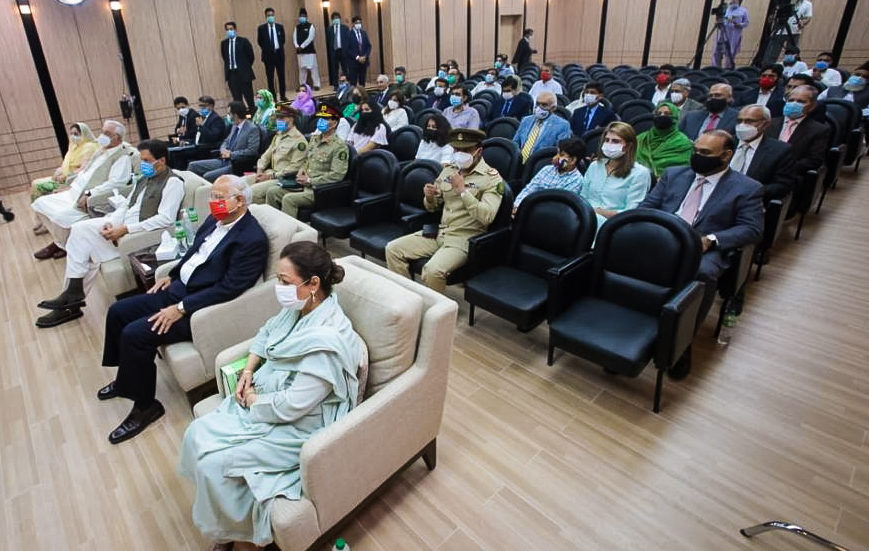
I want to talk about something with you, Mr. Imran Khan. Merit is a disqualifier in this country, a big disqualifier. You will have to focus on this aspect. What is our Pakistan? Imran, this is totally up to you. The 10th volume of my books I have given this title, ‘Light at the end of the Tunnel’, then later ‘Challenging Pakistan’s Destiny’ in fact you, Sir, are challenging Pakistan’s destiny. I am not a member of PTI but I have been a great supporter of yours from Day One and will remain a supporter because you have integrity and you have sincerity and that is what is required by this country. You have to have leadership, we have a leadership crisis, you have tremendous people. My company is known throughout the world as the best security services company in the developing world. I don’t go around saying this because it arouses jealousy. For 35 years I have had contracts of foreign embassies and that too, 35 years at a stretch; but the thing is it is Pakistani manpower. These 12 volumes started getting printed on 29th of June, 1800 volumes, on the 15th of July they were handed over to me in Lahore. Have a look at the quality of these books the way the printing was done. I asked our driver who drove these volumes to Karachi to wait in Sukkur and take a break, he did not, because he knew the volumes had to be in Karachi where a book launch was scheduled for 17th of July. Where would you get such people, such manpower, they are second to none in the world! Just look at our geographical position, we are part of South Asia, Central Asia, Middle East and the WEF has made Pakistan a part of Eurasia, many people still are not aware about this. Borge Brende says that Pakistan is a pivot for Eurasia. We keep thinking about CPEC, which is very important but we forget about the north-south corridor which is very important to us. The east-west corridor to the Middle East is important to us why? We have the second largest copper and gold reserves in the world, the third largest gold reserves in the world, fourth largest cotton and cotton industries in the world and fifth largest milk producing country in the world, sixth largest rice producing country in the world, seventh largest wheat producing country in the world. We have the nuclear potential and have the means to deliver them and that is why we are a deterrent. And in Imran we have the right leader, the time for consolidation is over, we have to get on with it. This country must live up to its potential, this country must be able to realize the dreams we live on and I am very proud of what you have done for Pakistan. I never do any business with government, the few times that I have done so, I have had it. Every government that comes in first checks me out, how many plots of land do I have, how many security contracts I have to be able to cancel them. I believe the private sector can do a lot. We have an Army that is second to none, look at the sacrifices they have made, they have fought the biggest counterinsurgency in the world and won it, they have fought the biggest counter terrorism in the world and won it. Today we are facing a huge crisis and I was so happy hearing your interview with Judy Woodruff when you did not mince your words, which incidentally none of our leadership could have done. Why? Simply because they have assets in London and in New York, if they respond strongly, it could put their assets in some jeopardy.
I would like to thank my family members who are here and Moeed Sahib and some of my staff who are here and I hope very sincerely that the future will be what you, Imran and I have dreamed about, you in your capacity as a national leader and I in my capacity as a humble observer. Thank you.
Moeed Pirzada: Thank you Ikram Sehgal sahib. Prime Minister, this is interesting, Mr. Sehgal spoke about Pakistan being a pivot. You Mr. PM had promised to set up a university at the PM House, but what we really need is a Regional University in Pakistan where students from Central Asia, Middle East, and elsewhere can come and read/study about regional issues. I think that will be huge contribution of yours to Pakistan, you are requested to kindly think about it. I now request you to come on stage and express your own thoughts.

PM Imran Khan: Ikram, I want to congratulate you and your family on the occasion of this book launch because when someone writes or does some other work the family’s support is critical. You talked about not forgetting certain things, for me when I started in politics is like when I first started swimming, I cannot forget this. I was 4 years old when my cousins took me to the swimming pool in Aitcheson College which was near Zaman Park and many used to go there to swim particularly in summertime. Standing there I could see everyone in the pool, in fact I was able to only see their heads and thought they were standing and that the water was not deep. Without another thought I jumped in the pool and had to be rescued by my cousins, later of course I learnt how to swim. The same was the case with politics, I did not know much about politics of Pakistan, I had no background of politics and none of my family members were in politics, in contrast I was aware more of international politics because I had read about this in university. Pakistani politics have a peculiarity of which I had no knowledge, of course this is true of all countries who have their own culture of politics. I just came into politics. I do remember that you, Ikram, had provided me with an armed guard. I was friends with both Benazir and Nawaz Sharif. Sharif was more interested in cricket and he became the Prime Minister only by chance. I knew them personally and they both offered me party tickets again and again, but I was opposed to their corruption and challenged them. It was only because of them that I entered into politics and ended up just like I had when I jumped into the swimming pool. That was when you provided me with an armed guard from Security and Management Services (SMS) thinking that I was alone in facing and challenging the dangerous mafias in Pakistan.
Coming to your writing, there are two aspects that I like very much, first of all, your patriotism was very much obvious in your articles, from your writings one could feel the pain the country was going through and that something had to be done about it. That the country was not performing to its potential, there were many negative aspects which you felt had to be removed. This theme ran consistently through your writings. Referring to his cricket experience of 21 years the PM said there were two types of players in the game, the one who played for himself and the other who thought of the whole team. The former always earned esteem and respect. Similarly, those who thought of individual gains and personal interests were never respected by nations, while those working for the country were respected and remembered, he said, adding Quaid e Azam always worked and thought for a nation. In the same manner, Nelson Mandela after spending 27 years in jail, he was adored by his people because he forgave all his adversaries, because his cause was just and larger than his own self. Imran Khan said that millions of people go to pay homage to the great spiritual personalities of Data Sahib, Baba Bulleh Shah and Baba Farid only because they selflessly served humanity, and devoted their whole life to it.
Another thing I want to share is also part of what I learnt as a cricketer. There are two types of players, one who when he enters the field is so worried about how he would fare in the match that he was driven by the fear of possible defeat. The other type was the player who only though about what would happen when he won, the thought of defeat never occurred to him. The idealists achieved success in life due to high aims and positive thinking whereas a pessimist always lagged behind. I always give the example of Edmund Hillary, a New Zealand mountaineer, who became the first climber to reach the summit of Mount Everest, before his achievement whoever had tried to climb this peak, the failed or died trying. This is what idealism or romanticism is all about everyone may have failed but I will climb this peak.
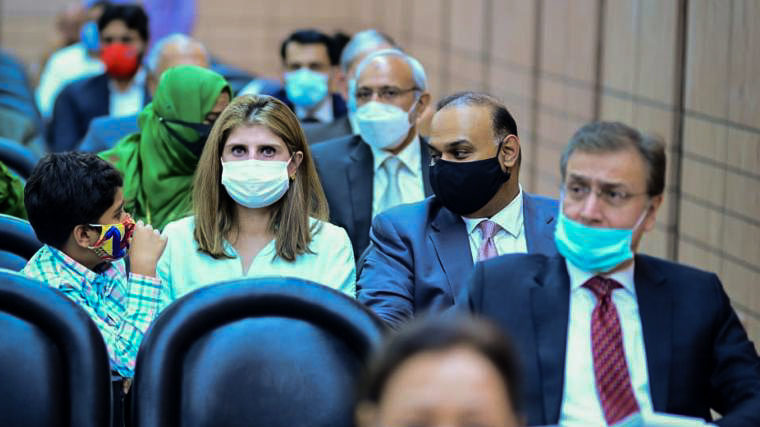
Pakistan’s immense potential has not been realized; in fact, we have underperformed. Pakistan is blessed with immense potential and huge natural resources, along with 12 different climatic zones where literally everything can be grown and then there are untapped tourism prospects. Switzerland, a country half of the size of the Northern Areas of Pakistan, was earning $80 billion annually from mountain tourism. If my shopping is done from Harrods and I go for vacation to London, it is not surprising that I know nothing about the immense tourism prospects of Pakistan. The past leadership have never given a thought to Pakistan as they spent their vacations abroad, went for hospital care to foreign lands, established businesses and preferred to shop outside the country. They had Swiss accounts and Mayfair flats like properties, so why would they bother about Pakistan.
Ikram, you spoke about your driver complaining about rising prices and lack of justice. Believe me, when I get up in the morning, I do not think that I am going to work but instead I am going to “jihad” through my constant struggle against corruption and injustices to create awareness among the masses about ‘the biggest cancer’. What is jihad? Ibne Khaldoon, the philosopher who is recognized as the father of modern history said that he understood from the study of Islam that Allah desires only one thing from us, he sent us to this earth to dispense Justice. Societies were shaped by rule of law with prevalent moral values and ethics, whereas justice was the criterion which ‘differentiated between a civilized society and a banana republic’. A society can only rise when governed by equal sets of law for the privileged and the poor classes but here in Pakistan the privileged class demands that no one can touch them and that everyone else should be put in jail and if you touch us, we will topple your government. Human society is based on rule of law not on ‘might is right’ which is the law of the jungle. To ensure rule of law in society there should be moral standards, moral authority and moral values otherwise you cannot ensure dispensation of justice. When the South African authorities tried to move against former President Jacob Zuma for his corruption, he incited people to come on to roads to evade accountability because he feels he is above the law. You will never hear of such cases in any Scandinavian country, when Iceland’s Prime Minister was implicated in the Panama Papers, huge crowds gathered and protested outside his residence, ultimately the PM had to step down. In societies that have no laws and no justice give opportunities for the privileged class to grow, this class remain untouchable and they can destroy the country. It is only the privileged class, particularly the ruling elite that indulges in corruption and not the common people, like patwaris, thanedars, etc. who do not have apartments in London or New York.
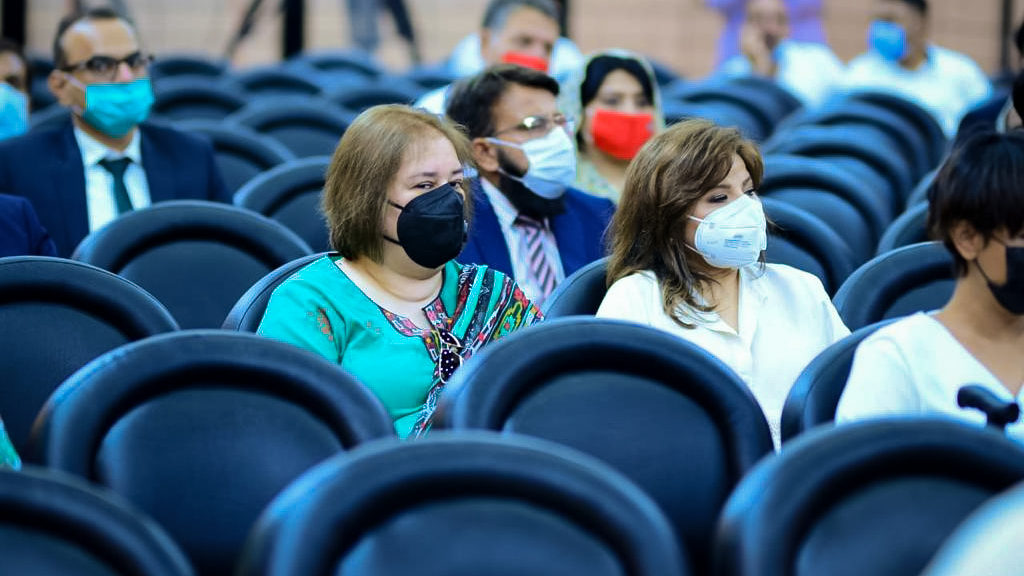
According to a report by the United Nations FACTI Panel the gap between the rich and the poor is getting wider and wider, it also said the about US$1000 billion is being pilfered from poor countries and sent to rich countries or to offshore accounts via money laundering. Such money laundering is not being done by the poor but by the ruling elite, it is the same story in all poor countries where the ruling elite is plundering and enriching themselves. The struggle of Pakistan is to hold these accountable and make them answerable to the law. Over the last 35 years the two corrupt families that ruled over Pakistan mercilessly looted the till with both hands but the gravest injustice they have done to the country is they made corruption acceptable to the society, no one thinks it is wrong anymore. When I was in England I remember if any politician, or businessman was under the stigma of corruption, he would be shunned by society at large, he would not be invited to parties/gatherings and even if he somehow managed to come on a TV channel, he would suffer in the same way as Ishaq Dar did giving an interview to Hard Talk. There is no escape for the corrupt, it is society that stands up and protests. Unfortunately, in Pakistan during the last 35 years corruption has become acceptable in society. Quoting Maulana Rumi the prime minister said a society’s downfall starts when its morality collapses, followed by financial and economic downfall.
Ikram, let me thank you once again for being so considerate about my welfare starting from when I first entered the political jungle, you gave me one SMS guard who used to be with me always. So, thank you and congratulations once again.


